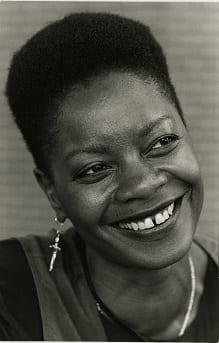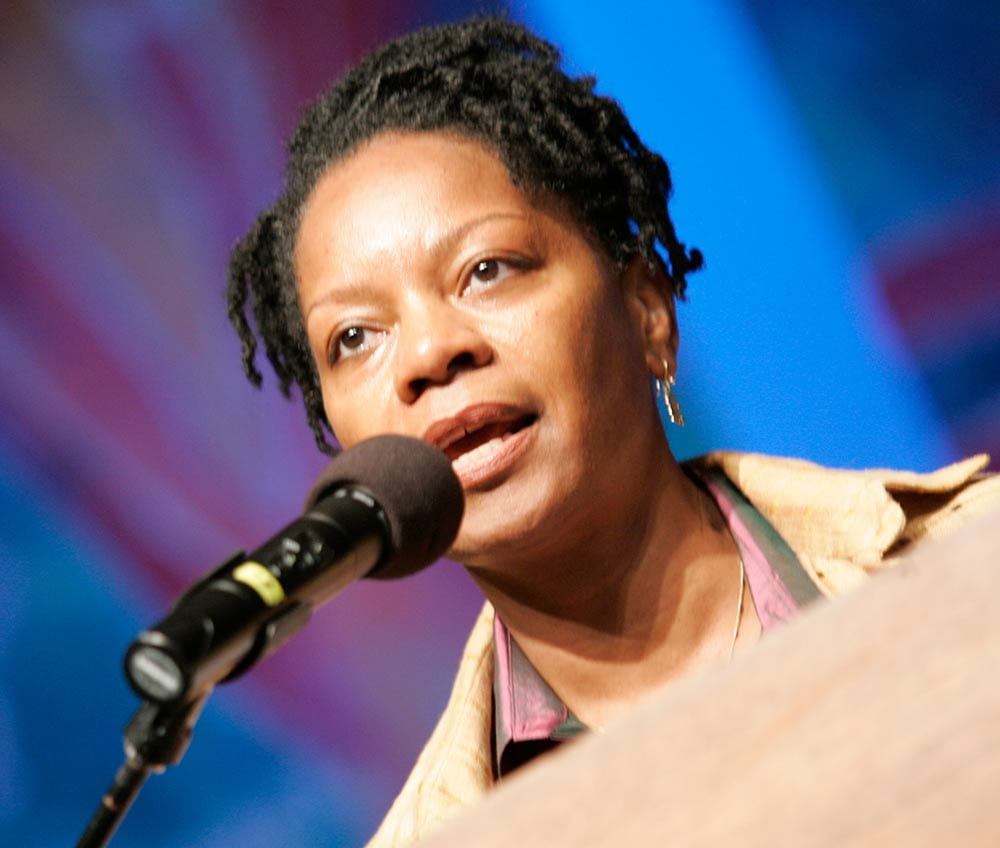Opal Moore
“This conference is, among other things,
an act of courage worthy of the woman Sister poet
Gwendolyn Brooks whose literary acts of courage
have inspired so many.”

Poet, author and critic, Opal Moore was educated at Illinois Wesleyan University and the University of Iowa and Iowa’s Writers Workshop, and has taught at institutions including Virginia Commonwealth University, Hollins College, and Kassel University in Germany. Now a Department Chair and Professor of English at Spelman College in Atlanta, Georgia, Moore’s fiction and poetry has appeared in numerous literary journals and anthologies, including Callaloo; Connecticut Review; Honey, Hush!: An Anthology of African Women’s Humor; and Homeplaces: Stories of the South by Women Writers. Moore’s collection of poems, Lot’s Daughters(2004), examines the transplantation of African Americans from the Deep South to her native Chicago, Illinois. Moore is a Fulbright Scholar, Cave Canem alumnus, and Bellagio Fellow.
Featured Poems
“Eulogy for Sister”
“The Taste of Life Going On”


Interviews, Talks, and Readings
Sister married a sometime preacher addicted to silk suits and the chickenfat attentions of christian women who wore unlined pink dresses and hats draped in black netting and were stingy in their smiles mostly reserved for weapons in fierce holy wars, the winners honored to the wretched eternal service of the God/men who seemed always so plentiful yet never sufficient for all the potato salad.
Cancer killed her the certificate said even though for Sister and her preacher/man cancer was no illness but a test of her character meaning she died for lack of faith in the healing hands of her God/man who promised he could petition the Master to save her life if she would but believe in him, and in Him, meaning she died of unbelief, and not of cancer, though she protested her faith shyly into my ear.
She did not want to be healed by doctors when she might conduct a miracle through the hands of her preacher/man, like the five babies she’d birthed she would birth herself a true God/man, a birthing not of her belly yet through the body, spoke to God on it, to be a conduit, to be agency for his uplifting, his coming closer to that higher power. So she prayed cancer into lightning rods, into the power of God, into the cruel hands of a man.
(Maybe she blasphemed to think she would be God’s instrument. Maybe her prayers were not humility but a gross boldness. Maybe she failed to predict God’s heavenly moodiness.)
She testified to her faith in healing then asked me to sing at her funeral: His Eye is on the Sparrow (and I Know He Watches Me) tipping God off that Sister might not deserve the miracle that awaited only the truly faithful as he tuned in that one day and overheard the sparrow-like chirping whispers she blew into my secret ear though she should have known better-you can’t keep a secret from God, and I could not sing her to the grave anyway. It wasn’t protocol proper for mourning. I would get frowns.
When I was seventeen I believed Sister could have chosen to keep the life she had. When I was thirty-five I believed she wanted to die. When I was a woman of a certain age I knew she prayed for a kind of power transforming. The life she had was not enough to live for, but to shame God and save a man’s soul, to birth a God out of your own death…? so she reached out, she pulled down a lightning hammer and put it in hands of the man who took her gifted tool of transforming love and sealed her in her coffin, then turned at her unlined black dress and black straw hat draped in pink netting wearing nothing on her face but grateful tears.
- sister got bold (didn’t she?) died. changed. (didn’t she?) changed dying (didn’t she, lord. oh, didn’t she…?)
Opal Moore, “Eulogy for Sister,” in Furious Flower: African American Poetry form the Black Arts Movement to the Present, ed. Joanne Gabbin (University of Virginia Press, 2004), 198-199.
I have never churned buttermilk. What does it require?
A shaded porch? A natural immunity to tears?
Memories of biscuits and bacon
cold? The way a man holds his neck
as he walks away from hungers
not his own?
A refusal of your eyes to follow him
the way butter runs to the crevices
of warm bread?
Opal Moore, “The Taste of Life Going On,” in Furious Flower: African American Poetry form the Black Arts Movement to the Present, ed. Joanne Gabbin (University of Virginia Press, 2004), 199.
Related Links
Interactive Program Day II